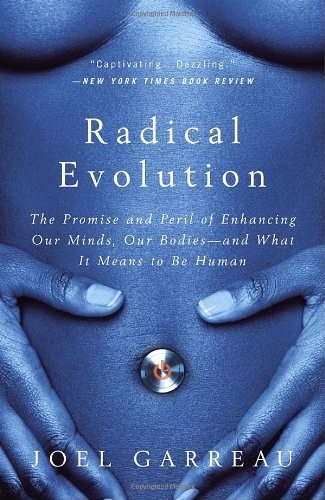










That science, in particular those of genetics, robotics, information technology and nanotechnology (the GRIN technologies) is shortly going to dramatically increase the power we have to change our very physical and psychological makeups is something that few of those knowledgeable about the subject seriously doubt. This book doesn't try to give an exhaustive account of the startling developments that will likely take place, but rather attempts to explore the moral issues involved and the astonishingly profound impacts upon society that they will likely soon have, probably to the extent of transforming our very idea of human nature itself.
The book's core is divided into three parts, each of which details a particular scenario, a possible future in which the human race is either led to heaven, to hell, or simply prevails. For each scenario, there is a focus on a particular personality in the debate, a representative of the particular position and, I guess, an attempt to add a little colour and 'humanity' to the narrative. For me, this blending of real, breathing human figures into a discussion of the scientific transformation of human nature doesn't quite work (perhaps the characters are a little too 'nerdy' or at least 'untypical' for it to succeed). However, the tripartite structure of the book is fairly effective. As visions of our collective near-future, 'heaven' and 'hell' might seem overly optimistic or pessimistic respectively, but the whole (and rather unnerving) point of the changes that are predicted to come is that they are likely to be ever more extreme and rapid. Ray Kurzweil (here, the proponent of the heaven outcome) has referred to it as the 'singularity', the author of this book as 'the curve' - essentially, the growth of the grin technologies is exponential. Whether you can swallow Kurzweil's prediction that progress will soon become so rapid that within a couple of hundreds of years the entire universe could become a single grand intelligence ('alive'), it should be simple to understand that once humans can artificially make themselves more intelligent (or machines make themselves more intelligent) then further improvements are likely to become increasingly fast, surely so fast that any society will not be able to control the outcome of such changes. Partly for this reason, the weakest scenario described is that of the 'prevail' outcome, where humanity simply muddles through, come what may. Though the cause of this scenario is not helped by the choice of personality to represent it, a man named Joel Garnier, who doesn't seem to be particularly foremost in any of the Grin technologies apart from being a writer of software. He also come across rather as some new age dreamer with a lot of babbling talk about interconnectedness and the wish to have the wings of cuttle fish.
One voice strikingly missing from the debate presented in the book is that of the British philosopher John Gray. His books, in particular `Straw Dogs', contain the most powerful expositions I have yet read of the belief that humanity can never be masters of its own destiny, above all in relation to the use of technology to enhance human nature and to direct it`s own evolution. Believers in the inevitability of the curve or singularity often point to the obvious truth that the military and economic advantages of using the grin technologies to enhance human beings will be so great as to be irresistible and unavoidable. The Americans will do it, because if they don't, the Chinese, Indians or Japanese will. Yet, as Gray says, `The new, post-human creatures that may emerge from these murky rivalries will not be ideal types embodying the best human ideals: they will reproduce some of the worst features of unregenerate humanity'.
There is, however, a brief discussion of the desirability of transcending human nature (something that is the proud goal of a group of scientists and thinkers who call themselves 'transhumanists'). The author, Joel Garreau, makes clear at the end that he is strongly in favour of allowing the 'enhancement' of humanity and would fall in the prevail camp if not the heaven. To his credit, each of the arguments and scenarios does seem to be given equal space and standing. This, and the fascination nature of the debate and the illuminating prose of the author, makes this book a very useful introduction to a morally complex, incredible, yet startlingly urgent subject.

